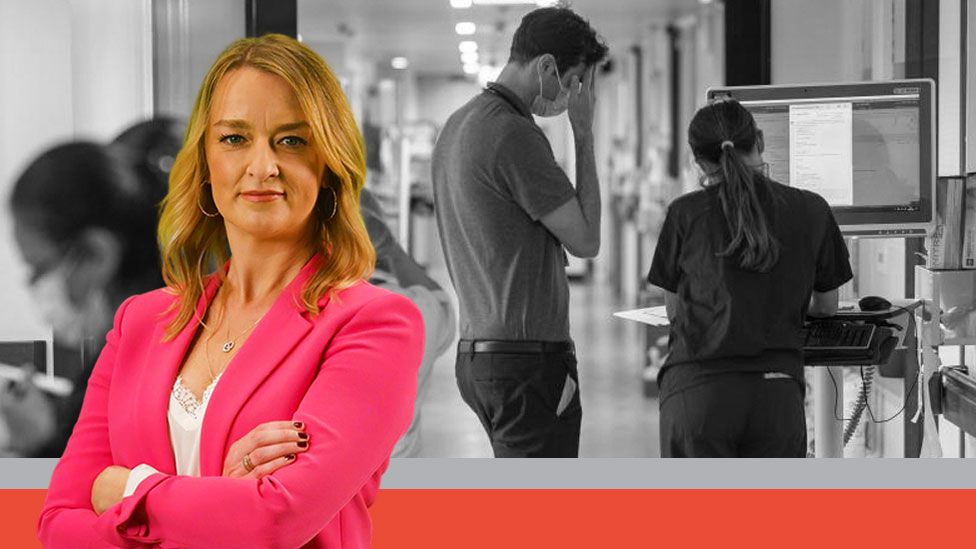
By Laura Kuenssberg
Presenter, Sunday with Laura Kuenssberg
The British have a love-hate relationship with the NHS.
According to researchers at the King’s Fund, the public gave the NHS its worst rating since records began 40 years ago. Just 29% said they were satisfied with the NHS in 2022.
And yet we still love it. A whopping 90% of the public agrees the service should be free and available to everyone.
But with more than seven million people on waiting lists, almost everyone knows someone who isn’t getting the care they need.
As the NHS approaches its 75th anniversary, politicians are falling over themselves to praise the service.
But when the cameras aren’t rolling, the message you hear can be a very different one. Just like us, politicians have a love-hate relationship with the NHS.
“The whole system is paralysed and not improving – all the progress is going backwards.” That’s not the kind of thing you’re likely to hear a minister say in public but it is the candid verdict of a former health minister talking privately.
They say the NHS chief executive has become the “rationer-in-chief” tasked with “spreading the jam more and more thinly” as the demand for care races ahead of what’s available.
Another Conservative former minister tells me the “National Health Service is an oxymoron”, a contradiction, because “the leadership is incredibly patchy and outcomes are mixed”.
For Labour, a source says there is increasing “anxiety and jeopardy” about the future of the service and “it really is a case of change or die”.
You’d be hard pressed to find a politician who would admit that services are being rationed but in off-the-record conversations that word comes up again and again.
Watch: Are you in a parallel universe on economy and NHS? – PM asked
One of the former ministers says “people have to understand that there is rationing according to wait” – saying that is the “trade-off” with the traditional model.
A former government adviser says “people know there is rationing – the service is pretty good when you get it – but you might not”.
You won’t find health rationing on any political leaflet or Facebook ad.
But the public’s attachment to the concept of the NHS remains extremely strong. Before and after the pandemic voters are in no mood for a discussion about changing its core principles – despite all the problems.
The former government health adviser tells me that any serious conversation about fundamental change is nigh on impossible.
“Any sophisticated Tory politician knows they’d sign their own death warrant” if they raised the prospect of a wholesale change, they say.
Remember Prime Minister Rishi Sunak’s proposal to fine patients if they missed a GP appointment? It was ditched almost as soon as it was suggested.
- On this week’s show is chief executive of NHS England Amanda Pritchard in her first major TV interview
- We’ll also hear from Labour’s shadow education secretary Bridget Phillipson
- Watch live from 09:00 BST on BBC One and BBC iPlayer or watch and follow updates here on the BBC News website
- Email the show anytime: kuenssberg@bbc.co.uk
Another former official describes the public’s strong emotional connection to the idea of the institution itself, saying: “It’s like your family. I’ll moan and moan and moan about it, but if someone else from outside has a go at them, I’ll have them on toast. It’s like criticising your football team – they can naff off!”
Plenty of politicians talk about reforms to the service – whether that is working with the private sector or this week’s workforce plan. But whether it is required or not, it is almost unthinkable now that any mainstream politician would argue for a sweeping change to the whole system.
Of course, that has an impact on what governments choose to do to try and improve the service, which might not be the most effective long-term focus.
One former official suggests: “Politicians want solutions with easy metrics like cutting waiting lists.
“If you do cut them in the short term, that just means more operations, it doesn’t address stopping people being ill in the first place.”
A former minister says rather than go for bold reforms after the pandemic “we have gone straight back to the voodoo land of heroic pointless commitments that will never get met because as a country we are so ill”.
Another suggests ministers are actually scared of telling the public hard truths about increasing cost pressures in the health service. “The public has unrealistic expectations of what we can deliver – the government is frightened of that,” they say.
And as we’ve talked about many times here and on the show, unless and until governments confront the aching gaps in care for the elderly and vulnerable, the rest of the health service has to absorb the costly consequences of social care system that to a large extent just doesn’t work.
One of the former ministers I’ve spoken to is intensely frustrated that it is so hard to have a full conversation about the NHS, saying that “it’s a political problem, not a resources problem. Our politicians just aren’t finding the space” to talk about really bold changes.
One former adviser agrees, saying “everyone of all stripes is scared to take it on”.
Yet the fact politicians find it almost impossible to talk about alternatives is also a tribute to the longevity of the NHS and the public’s belief in it.
The former adviser suggests that while people have to wait and outcomes vary “as a system it is extraordinarily fair and that has to be worth something”.
Love it and hate it. It is most certainly here to stay.







